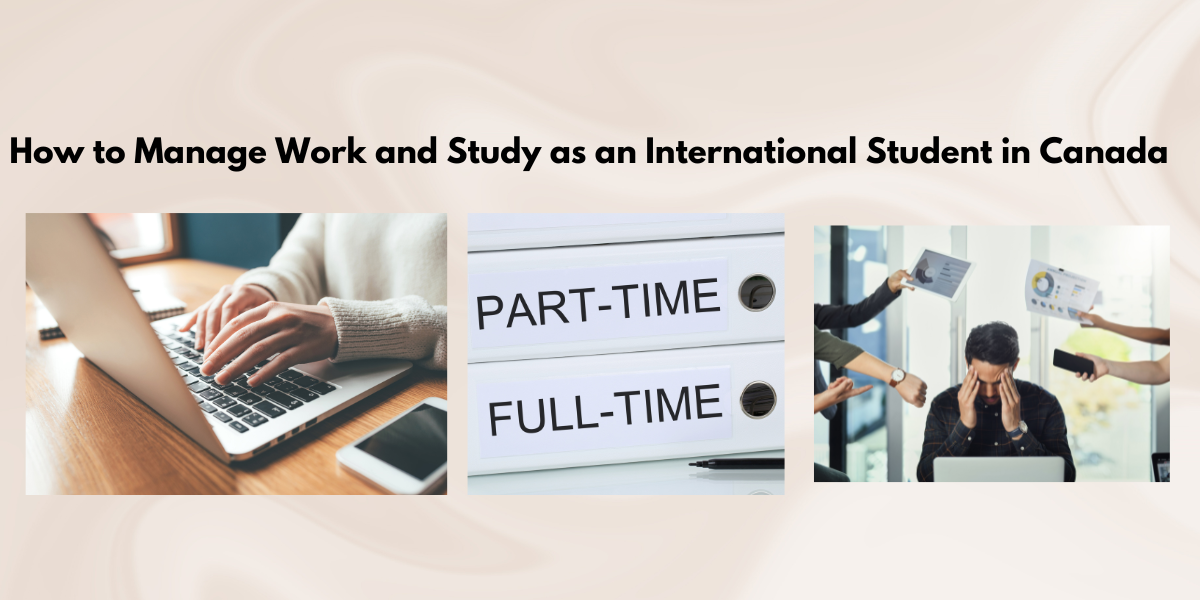Can You Work While Studying in Canada as an International Student?
Introduction
Canada is one of the most popular destinations for international students, known for its high-quality education, welcoming culture, and post-graduation,The short answer is yes, but there are specific rules, requirements, and opportunities to understand before planning your study-work balance.
In this post, we’ll dive deep into all aspects of working while studying in Canada, covering essential points such as on-campus vs. off-campus work, limitations, and the benefits of gaining work experience while pursuing your education.
Working While Studying in Canada: An Overview
International students studying in Canada under a valid study permit are allowed to work, but they need to adhere to specific rules. There are two primary options available to students: working on-campus and working off-campus. Both options offer valuable opportunities for students to gain experience and support their financial needs.
What You Can Expect:
- Overview of work opportunities for students
- Limitations on the number of hours
- Benefits and drawbacks
- Legal and academic considerations
Advantages and Disadvantages of Working While Studying
Advantages
- Financial Support: One of the main benefits of working while studying in Canada is the ability to support yourself financially, whether it’s covering tuition, living expenses, or general personal needs.
- Professional Experience: Working alongside your studies provides practical experience, making you more attractive to future employers and helping to build valuable skills.
- Networking Opportunities: Building connections in Canada’s workforce can lead to potential job offers or career opportunities after graduation.
- Post-Graduation Employment: Gaining work experience during your studies can help you qualify for a Post-Graduation Work Permit (PGWP).
Disadvantages
- Time Management Issues: Balancing work and studies can be tough, and it may take a toll on your academic performance.
- Limited Hours: Off-campus, international students are restricted to working 20 hours per week during regular semesters, which might not be enough for those needing more substantial income.
- Legal Concerns: Failing to comply with work regulations could impact your study permit and legal status in Canada.
Problems and Concerns
Despite the many benefits of working while studying, international students often face a range of challenges. Here are some of the common concerns:
- Time Restrictions: As a student, you’re allowed to work 20 hours per week during regular study periods and full-time during holidays. While this flexibility helps with extra earnings, it might not be sufficient to cover all financial needs.
- Balancing Academics and Work: Many students find it difficult to juggle both work and studies, particularly during exams or when assignments are due.
- Work Permit Violations: Some students mistakenly overwork beyond the allowed hours, which can lead to severe consequences such as losing their student visa or being deported.
- Language Barriers: For non-native English or French speakers, finding a job in Canada might be difficult if language proficiency is a requirement.
Dos and Don’ts of Working as a Student in Canada
Dos
- Ensure You Have a Valid Study Permit: You must have a valid study permit to work both on-campus and off-campus.
- Follow Hour Restrictions: Stick to the 20-hour weekly limit during term time to avoid penalties.
- Search for On-Campus Jobs: These are typically easier to manage alongside your studies.
- Seek Internships: Internships related to your field of study are valuable for career growth.
Don’ts
- Don’t Exceed the Allowed Work Hours: Violating work hour restrictions could lead to serious consequences, including deportation.
- Don’t Neglect Your Studies: Always prioritize your academics, as your study permit is based on your ability to complete your course successfully.
- Don’t Work Without Proper Documentation: Make sure your employer knows you’re authorized to work in Canada.
FAQs
- Can international students work full-time during breaks?
Yes, students can work full-time during scheduled breaks, such as winter and summer holidays. - Do I need a separate work permit to work off-campus?
No, if you have a valid study permit that includes work eligibility, you don’t need a separate work permit for off-campus work. - What happens if I exceed the 20-hour work limit?
Exceeding the 20-hour limit is considered a violation of your study permit conditions and could result in deportation. - Can I work in Canada after graduation?
Yes, you can apply for a Post-Graduation Work Permit (PGWP) to work in Canada after completing your studies. - Are there any job restrictions for international students?
Some jobs may require a high level of language proficiency or professional certification, limiting options for certain students.
My Advice
Working while studying in Canada is a great opportunity, but it requires careful planning and time management. Always prioritize your academic goals and make sure you comply with visa regulations. Look for jobs that complement your field of study to make the most of your Canadian education experience.
Conclusion
In summary, international students in Canada can indeed work while studying, both on and off-campus, as long as they follow the rules and restrictions set by the government. With the right balance of work and study, students can gain valuable experience, supplement their finances, and enhance their future career prospects. However, it’s essential to prioritize academics and stay within legal boundaries.







